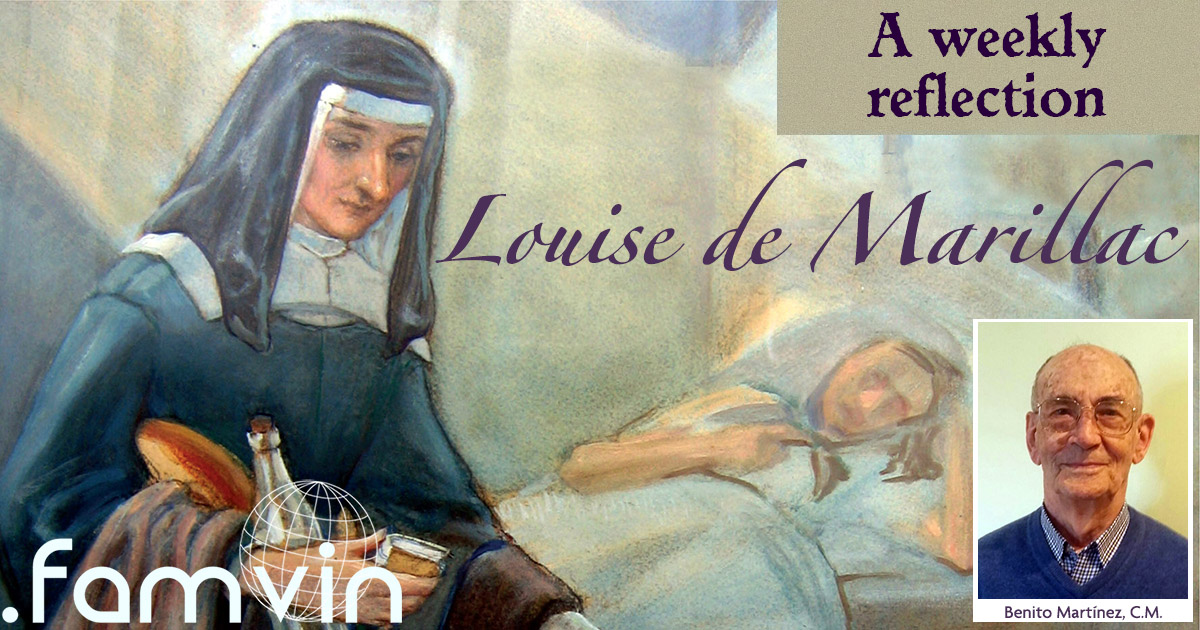Students have finished the course 2016-2017 in Spain, and holidays are starting; it maybe be a good occasion to stop to thank God, the community and all, for the favors that have made us during this course. Saint Louise may serve as an example.
“Your grapes are perfectly beautiful. You know that I do not have any teeth to eat the small ones; thank you for them” [L. 356 bis]; I “thank you very much especially for the beautiful and delicious figs which arrived just at the right time for everyone here” [L. 413]; or “we thank you with all our hearts for the beautiful fine thread you sent us. You are well aware that we have little” [L. 440]; “I thank you very humbly, my dear Sister, in the name of the entire community, for the excellent fish” [L. 515].
Saint Louise.
Reflection:
- There are many signs of gratitude expressed by Saint Louise de Marillac in her letters, which often ends with the phrase: most grateful daughter or servant. It could be a social formula of education, but most of the time it was sincere thanks to those who cared about her well-being, her son’s, St. Vincent’s, the Company’s or the poor’s.
- Grateful people feel satisfied in their social relationships and know how to deal with the difficulties of life, spending more time looking for solutions, without trying to avoid them and without blaming anyone. They are generous, according to Cicero, because “gratitude is not only the greatest of virtues, but the mother of all others.”
- Gratefulness is an emotion that you feel in your heart when someone discovers that another helps him or gives him something, because he loves him. He feels that the other loves him and feels obliged to correspond also with love in the form of gratitude. Gratefulness implies the love of a person towards another who is needy, while it is expected that the person will recognize the love with which he gives it and correspond to it with gratitude, as he also shows his love. The important thing is love. It is frequent in the letters of St. Louise the phrase “I thank you for the signs of love that you give me.”
- The gratitude she expresses to Sister Isabel Hellot, who has cared for her son Miguel, sick, while she was in Nantes, is touching: “I am grateful to all our sisters for having labored for my son, and I thank them wholeheartedly for their dear affection, that they could not have demonstrated on a more meaningful occasion.” (L.152). When Saint Louise writes to Sister Juliana Loret the phrase “I thank you with all my heart for your loving concern” (L. 311), she is indicating that gratitude is the beginning of friendship.
- If we do not receive gratitude for the good we do, perhaps it is because we have not known how to manifest the love with which we do it. If I do not recognize that the other person has affection for me and therefore helps me or gives me something, there is no feeling of gratitude in my heart. I am afraid to be manipulated or be helped by interest.
- To be grateful we need a minimum of humility and accept the needy situation in which we find ourselves; situation, in a way, of inferiority.
Questions for dialogue:
- What rapport do you have with your friends? Do you appreciate those relationships? Are you grateful to those around you? And with the unknown migrants? Do your family and your friends consider you grateful because you participate and collaborate?
- Are we thankful for courtesy or because it comes from our hearts? Do we thank in the same way the people we like and those we dislike? Have you reflected why some poor people do not appreciate what we do for them?
Benito Martínez, C.M.






0 Comments